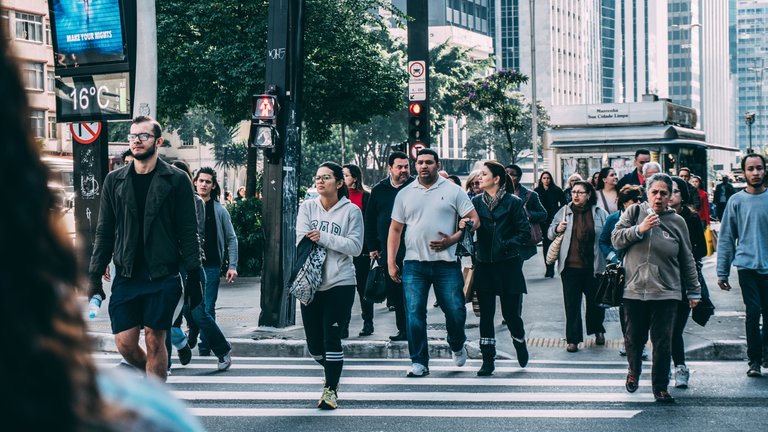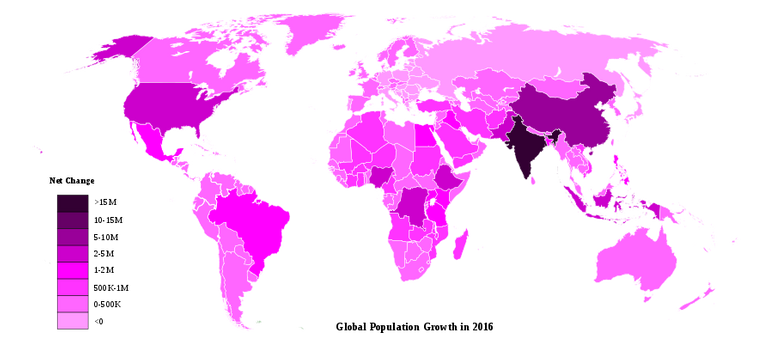Comments on overpopulation
 |
|---|
| Photo by Kaique Rocha at Pexels |
What is overpopulation?
Overpopulation occurs when there are so many people living in a space that it is impossible for them to maintain a balance in terms of the carrying capacity of the space. This means that if there are too many people living in a place it will be very difficult for everyone to dispose of the waste they produce, as they would make more garbage than they can recycle, for example. It could also cause the average amount of food they produce to be less than the average amount of food they consume, and cause a serious food problem. Currently, overpopulation is causing the pollution we produce to be higher than the planet's capacity to regulate it, leading to climate problems such as global warming, etc.
David Attenborough described the level of human population on the planet as a multiplier of all other environmental problems. In 2013, he described humanity as "a plague on the Earth" that must be controlled by limiting population growth.
I share Attenborough's argument. I believe that most of our current major problems are rooted in the sheer number of people living together on the planet and to the unequal distribution of people across countries.
"In 2000, there were 18 megacities (conurbations such as Tokyo, Beijing, Guangzhou, Seoul, Karachi, Mexico City, Mumbai, São Paulo, London and New York) that had populations in excess of 10 million. Greater Tokyo now has 35 million, more than the entire population of Canada (with 34.1 million)."
 |
|---|
| Net annual increase in human population by country - 2016. Wikipedia |
Population density causes imbalances that are difficult to control, obviously due to the incredible number of people. Diseases have an easy path to spread in these places, catalyzed by our current global mobilization capability. It is easy to control an outbreak with a small group, which is equivalent to saying that it is very difficult to control a pandemic if there are many people affected. The speed of care is compromised by the number of people affected.
How does the population grow?
"All species reproduce much more than is necessary for the maintenance of their population, from fish that lay millions of eggs to the elephant, which living about 80 years has an average of 6 individuals per breeding pair, however diseases or predators ensure that the number of breeding individuals that in both cases leave offspring is about two (each species uses a reproductive strategy producing many offspring that it leaves to their fate or few but spending their time and resources in their care)."
Darwin, 1876
What Darwin said (in the quote) was natural, and is natural for most species, but we humans managed to overcome the problems that nature imposed on us.
 |
|---|
| World population growth curve (Wikipedia) |
The population is currently growing by approximately 75 million people per year. Medical advances have made it possible for us to live much longer. Generations can live together. If this continues, by 2050 there will be 9 billion of us.
Even if there may be population stagnation in the future, the number we achieve at that time will probably be too large.
Why is overpopulation a problem?
"The power of population outstrips the power of the earth to provide subsistence for man, so premature death, in some form or other, must visit the human race.
"VII, paragraph 10, lines 8-10. An Essay on the Principle of Population. London: J. Johnson,. 1798. > > "VII, paragraph 10, lines 8-10.
Imagine that the planet earth is like a supermarket. There are a million people in line to shop and you are sure to have every customer waiting. The speed with which you serve them is reasonable and you will be able to satisfy them all.
When one of the people is served, he/she obviously leaves the store and consumes what he/she bought. And when he runs out, well, he just goes back to the supermarket. The only difference is that now he comes with, let's say, 4 more. They stand at the end.
Everyone in line has the same plan: buy, consume, come back for more with one more. When the first million are served, in the new queue there will be 4 million. They will take longer to be served, and then they will come back with 4 more people.
At the third round there will be 16 million, at the fourth 64, but in this round the first million will no longer return because they will have passed away. So on and so forth. At some point, the supermarket, which has a limited capacity to serve, will be overwhelmed.
So, with this crude example, this is how overpopulation can affect us. The supermarket will not be able to serve everyone at some point, there will be so many people that it will not be able to clean the aisles in time, and, with so many people crowded together, disease will spread more easily.
What is the ideal number?
Population Matters considers an optimal or sustainable population, for which both environmental factors and ecological footprint should be taken into account, to be 2.7 to 5.1 billion people.
What should be done?
To control the population, many recommendations have been given. I am not an expert, but I agree with many of them. And I don't think you need to be an expert to realize that they are useful.
- Birth control: as in China, one or two children per family.
- Better accessibility to contraceptive methods: we all still do it but without blessings.
- Paulatina redistribution of the population: try not to have so many people in one place.
Among other great and good ideas that the experts should already be devising.
HTTP is in use instead of HTTPS and no protocol redirection is in place. Be careful and do not enter sensitive information in that website as your data won't be encrypted.
It's also a good habit to always hover links before clicking them in order to see the actual link in the bottom-left corner of your browser.
Congratulations @migka! You have completed the following achievement on the Hive blockchain and have been rewarded with new badge(s) :
Your next target is to reach 300 upvotes.
You can view your badges on your board and compare yourself to others in the Ranking
If you no longer want to receive notifications, reply to this comment with the word
STOPCheck out the last post from @hivebuzz: